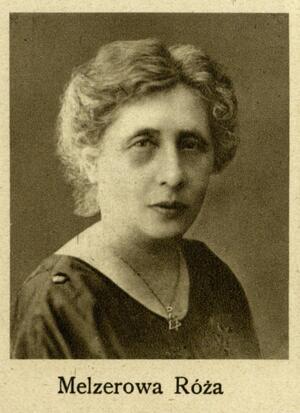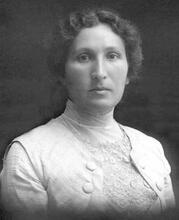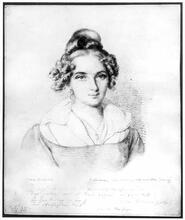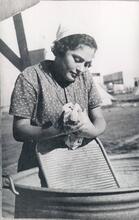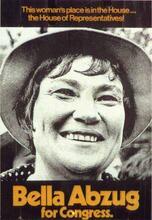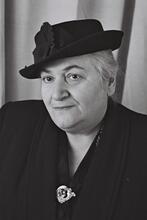Róża Pomeranc-Melcer
Róża Pomeranc Melcer was an early proponent of Zionism in Galicia, committing to Zionist organizations and promoting the establishment of women's associations. She implemented social reform projects and advocated for the feminist goals of modern Zionist women's politics, especially in interwar Poland. At the center of her life was the city of Lwów, where she founded the long-standing Jewish Women's Circle (Koło Kobiet Żydowskich) (1910-1939). As a direct result of her social commitment, she became politically active and was the first and only Jewish woman Member of Parliament in the Second Polish Republic (1918-1939).
Family & Education
Róża Melcer (née Pomeranc) was born in Tarnopol (now Tarnopil/Ukraine), Poland, in 1873 (although some sources list her year of birth as 1880), as the eldest daughter of Mendel and Hania (née Bejla) Pomeranc. German and Polish variations of her name include Melzer, Pomeranc Melzer, Pomeranz Melzer, and Melcerowa, and even incorrect spellings such as Melerowa or Meltzer. She grew up in a middle-class family in which her father, a bank officer, introduced her to German language and literature. Beside her eight years of schooling, Pomeranc also received private music lessons in Tarnopol. Generally, at that time, in the 1880s, girls of the middle class attended private schools, but it is also possible that Pomeranc went to Ternopol’s Joseph Perl girls’ school. She continued piano lessons as a young adult in Leipzig, Germany, later studying at Leipzig’s Royal Conservatory of Music. Pomeranc also studied foreign languages and drama. However, information about her education in contemporary literature is sparse and sometimes contradictory.
Zionist Activism
Beginning in the 1890s, Róża Pomeranc became involved in the Zionist movement of Galicia, part of the Habsburg Monarchy from 1772 to 1918. She was already interested in Zionism, having organized with her youngest brother Abraham the first Zionist youth gatherings in her hometown. She founded Zionist women's associations, such as Judyta (Judith) in Tarnopol in 1902 and Rachela (Rachel) in Kolomea (today Kolomyia/Ukraine) in 1901. She also spoke at various Maccabean celebrations and gatherings to promote Zionism and, above all, to recruit Jewish women for the movement. As early as 1901, she became a member of the regional Zionist executive committee of the districts of Tarnopol and Galicia.
In 1906, Róża Pomeranc married Izaak Melcer (Melzer) (?-1933), a railway director, with whom she moved to Lemberg/Lvov (today Lviv/Ukraine) in 1908. Her house, like her parents', turned into an important Zionist gathering place. The couple did not have children.
In 1908, Pomeranc Melcer founded the "Jewish Women’ Circle" (Koło Kobiet Żydowskich, KKŻ) in Lvov, of which she became chairperson until 1926. Two years later, in 1910, she established the “Jewish national women's association for Galicia and Bukovina” during the first national assembly of Zionist women's organizations in Galicia, where she was elected as chairwoman. Pomeranc Melcer participated also in other international Zionist congresses and in 1911 she became a representative of the Zionist Women's Association for the District of East Galicia. She was one of the few female delegates at the 10th Zionist World Congress in Basel, Switzerland, where she proposed the establishment of an international organization of Zionist women. In 1929, Róża Pomeranc Melcer emerged as one of the co-founders of the Polish section of the Women’s International Zionist Organization (WIZO) (in Polish: "Zrzeszenie Żydowskich Kobiet dla Pracy Propalestyńskiej W.I.Z.O. we Lwowie") in East Lesser Poland and in Lvov. She was elected to the executive committee in 1930.
Writing
Pomeranc Melcer wrote many significant texts, stories, plays, novels, and articles in both German and Polish for well-known German and Polish Zionist newspapers, such as Die Welt (World) (1897-1914), Przyszłość (Future) (1892-1899), and Wschód (East) (1900-1913). Wanting to inspire Jewish women to become involved in Zionism, in 1897 she published her earliest journalistic text, the pamphlet "Women and Zionism," in the journal Die Welt. During the interwar period, she lectured on feminist issues and wrote for the Zionist women's movement, publishing several articles in the Polish-language Jewish women's magazine Ewa between 1928 and 1933.
Politics and Feminism
Pomeranc Melcer's career as a parliamentarian and minority representative in the Parliament of the Second Polish Republic began in 1922 when she was elected as deputy to the Sejm (lower house of the Parliament) and Senate (upper house of the Parliament) during the country’s first free democratic elections; she remained until 1927. She represented the Constituency of Stanisławów (today: Ivano Frankivsk/Ukraine) and the Zionist Organization in Poland (Organizacja Syjonistyczna w Polsce). Pomeranc Melcer was one of the few female MPs and the only Jewish woman in the Polish Parliament during the interwar period. As a member of the association of Jewish MPs “The Jewish Circle” (Koło Żydowskie), she represented the association at Polish and international congresses of national minorities and Jewish women.
During her time as deputy, Pomeranc Melcer was particularly concerned with social issues as part of the Commission for Work and Social Welfare (Komisja Pracy i Opieki Społecznej) and as vice president of the “State Central Committee for the Care of Orphans”. She was an exceptionally gifted speaker. Her parliamentary speeches expressed her concerns for the Jewish minority in Poland, as well as for the legal standing of women. Her 1927 speech opposing discrimination against the Jewish population in the social sphere was especially striking. She argued that the budget of the Ministry of Labor and Social Welfare was too low to ensure adequate support of the needy Jewish population, especially the care of Jewish children and young people, and argued that municipalities received too little money from the state to adequately fund Jewish orphanages, a policy she denounced as “shameful.” Her speech reflects her linking of national and gender issues: in order to publicize the most important needs of the Jewish population, she spoke as a Zionist politician representing the Jewish nation and the Zionist party, but she also spoke for a Zionist women's organization and an orphanage in Lvov. Pomeranc Melcer held the Polish state responsible for taking care of all its citizens, including Jews, if the Jews were to feel secure and be willing to cooperate with the state. She ran unsuccessfully as a Zionist in the parliamentary elections of 1928 and 1930; her political career ended then, but not her social and political commitment to women’s issues. She continued to engage in political discussions and to call for greater political participation by Jewish women and increased parliamentary representation of women in general.
Conclusion
Pomeranc Melcer died of an illness in Lvov in 1934. She had created a space in Polish Zionism for women to be involved in solving their unique political issues and initiated social reform projects and supported the goals of modern Zionist feminist policies in Poland, especially after 1918. At the heart of her work were Zionist women's organizations in Galicia, where Pomeranc Melcer founded the long-lasting “Jewish Women’s Circle” (1908-1939) in Lvov and played an important role in establishing local female Zionist networks. Her subsequent political activity was a direct result of her social commitment. As a member of parliament, Pomeranc Melcer criticized both Polish society and Jews for inadequate attention to local and gender issues. She was one of the most important representatives of the Zionist women’s movement and of politically active Jewish women, whose work still needs to be made visible in order to achieve a full history of Zionism.
Bałaban, Majer. “Wrażenia z Tarnopola [Impressions from Tarnopol].” Wschód [East] 1 (1908): 10.
Chwila [Moment], no. 3934 (March 8, 1930).
Die Welt: Zentralorgan der Zionistischen Bewegung [The World. Central Organ of the Zionist Movement], Vol. 5 (1901), issue 25 (June 21, 1901): 6. Accessed August 19, 2019. http://sammlungen.ub.uni-frankfurt.de/cm/periodical/pageview/3397895.
Gelber, Nathan M. Toledot ha-Tenu‘ah ha-Ẓiyyonit be-Galiẓyah [The development of the Zionist Movement in Galicia], Vol. 1, Jerusalem: ha-Sifriyah ha-Tsiyonit be-hotsaʼat Reʼuven Mas, 1958.
Hüchtker, Dietlind. 2014. Geschichte als Performance. Politische Bewegungen in Galizien [History as performance. Political movements in Galicia ar.] Frankfurt/New York: Campus Verlag, 2014.
Hüchtker, Dietlind. “Erfahrung als politische Kategorie. Geschlecht und Nationalität in der Publizistik der Zionistin Rosa Pomeranz aus Galizien” [Experience as political category. Gender and nationality in the journalism of the Zionist Rosa Pomeranz from Galicia]. Wiener Zeitschrift zur Geschichte der Neuzeit, 2 (2002) 2: 57-72.
Koło Kobiet Żydowskich, ed. Pamięci Róży Melzerowy [In remembrance of Róża Melzer]. Lwów: Nakładem Koła Kobiet Żydowskich, 1936.
Leszczawski-Schwerk, Angelique. Die umkämpften Tore zur Gleichberechtigung. Frauenbewegungen in Galizien [The embattled gates to equality. Women`s movements in Galicia] (1867-1918). Wien et al.: Lit, 2015.
Leszczawski-Schwerk, Angelique. “Dynamics of democratization
and nationalization: the significance of women’s suffrage and women’s political participation in parliament in the Second Polish Republic.” Nationalities Papers, 2018. https://doi.org/10.1080/00905992.2017.1370701.
Melcerowa, Róża. “Bez reprezentacji” [Without representation]. Ewa. Pismo tygodniowe 1 (1928): 2.
Antosik-Piela, Maria: Róża Pomeranz-Melzer. Accessed September 15, 2019. https://sztetl.org.pl/he/roza-pomeranz-melzer
Rudnycki, Szymon. Żydzi w parlamencie II Rzezczypospolitej [Jews in the Parliament of the Second Polish Republic], Warszawa: Wydawnictwo Sejmowe, 2004.
Sprawozdanie stenograficzne z 319 posiedzenia Sejmu Rzeczpospolitej z dnia 7 lutego 1927 r. [Stenographic record of the 319. meeting of the Polish Republic Parliament from February 7th, 1927]. Accessed August 20, 2019. http://dlibra.umcs.lublin.pl/dlibra/publication?id=10888&tab=3.
Steffen, Katrin. “Für ‘bewusste Mutterschaft’ und eine ‘physische Erneuerung der Judenheit’ – die jüdische Frauenzeitschrift Ewa” [For “conscious maternity” and a “physical renewal of the Jewry” – the Warsaw Jewish Women’s magazine Ewa]. In Frauen und Frauenbilder in der europäisch-jüdischen Presse von der Aufklärung bis 1945 [Women and images of women in the European-Jewish press from enlightenment until 1945], edited by Eleonore Lappin and Michael Nagel, 103-122. Bremen: edition lumière, 2007.
Wagman, Szulim, and Róża Melcerowa. 1930. “Echo naszej akcji w sprawie wyborów do przyszłych ciał parlamentarnych, głosy czytelników” [The echo of our action in the matter of elections to the future Parliament body, readers’ comments]. Ewa. Pismo tygodniowe [Ewa. weekly magazine] 37, 135 (1930): 1.
Wschód [East]. 1 (1901): 17.
Zionistisches Aktionskomitee [Zionist Action Committee], ed. Stenographisches Protokoll der Verhandlungen des X. Zionisten-Kongresses in Basel vom 9. bis inklusive 15. August 1911 [Stenographic record of the negotiations of the 10th Zionist Congress in Basel from August 9th to 15th, 1911], Berlin: Jüdischer Verlag, 1911.

